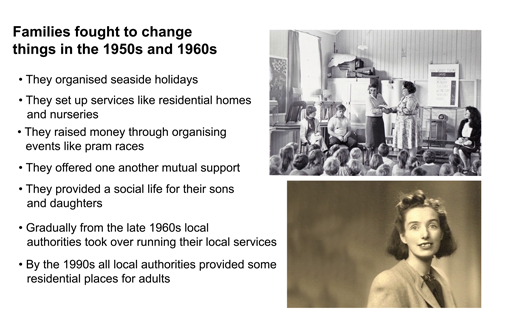4 Family advocacy and family carers
Families have not taken neglect lying down. Banding together in organisations like Mencap and Enable (Scotland), families have fought hard to get their roles and needs recognised. Play the slideshow below to see some of the actions families in the 1950s and 1960s took.

Transcript: Slideshow 1 Activities undertaken by parents to create change
The achievements of families fighting for a better life have been enormous. As a result of their efforts, improvements in community services gradually built up in the late 20th century. For example, day centres have offered somewhere to go in the daytime, giving families time free of caring responsibilities, and providing an alternative to employment. Alternatives to living at home or in a hospital, such as hostels, group homes, supported living, and even home ownership or tenancies have also increased.
Meanwhile, financial benefits including Disability Living Allowance and, later, Personal Independence Payment were introduced, while income support had additional disability premiums.
The role of families was slowly recognised by policy makers, particularly as hospitals began to close and ‘care in the community’ became the policy from the 1980s. Governments belatedly recognised family carers as an important resource who saved them money. The word ‘carer’ came into use to mean someone, usually a family member, who supported someone without pay.
The National Strategy for Carers, England (1999), the Strategy for Carers in Scotland (1999) and the National Carers Strategy, Wales (2000) paved the way for:
- carers to have their own needs assessed
- support and involvement in decisions
- respite services to let carers take a break
- payment if caring for at least 35 hours a week.
Box _unit4.4.1 Box 2 What is a carer?
A carer is defined by NHS England as:
anyone, including children and adults, who looks after a family member, partner or friend who needs help because of their illness, frailty, disability, a mental health problem or an addiction and cannot cope without their support. The care they give is unpaid.
(NHS England, no date)
Under the Care Act 2014 (England), carers are entitled to an assessment where they appear to have needs. This matches the rights to an assessment of the person being cared for. Similar provisions apply across the UK, under the Carers Scotland Act 2016, the Social Services and Well-being Act (Wales) 2014, and the Carers and Direct Payments Act (Northern Ireland) 2002. Carers will be entitled to support if they meet these criteria:
- the carer's need for support arises because they are providing necessary care to an adult
- as a result of their caring responsibilities, the carer's physical or mental health is either deteriorating or is at risk of doing so, or the carer is unable to achieve any of the outcomes as specified in the regulations and as summarised in the section
- as a consequence of being unable to achieve these outcomes, there is, or there is likely to be, a significant impact on the carer’s wellbeing.
Carers can claim money, if caring for more than 35 hours a week. In 2019, this was £64.60 per week in England, more in Scotland. However, receiving this less than generous benefit can affect other benefits – for example, severe disability premium can be stopped.
